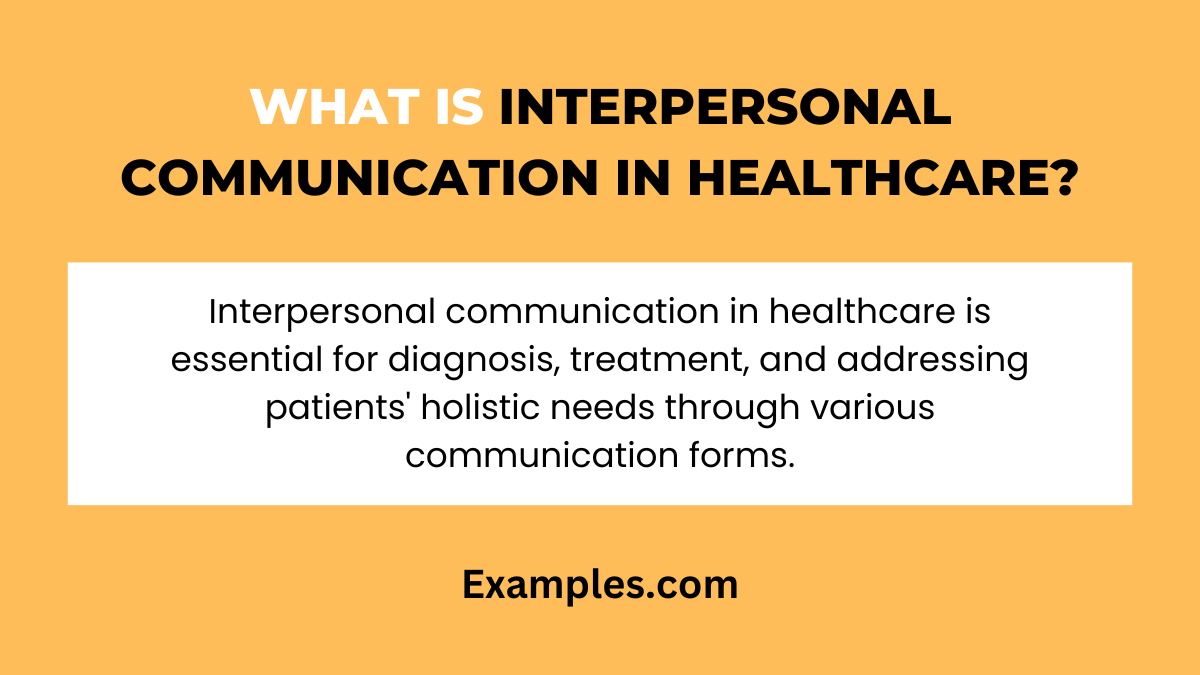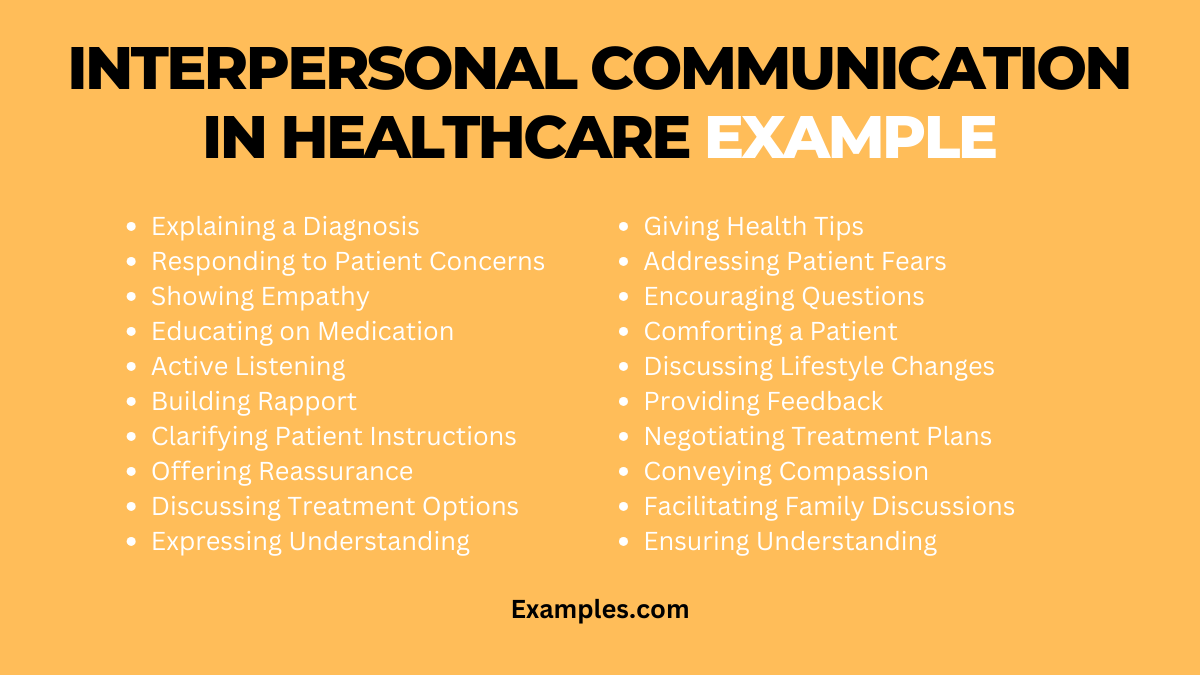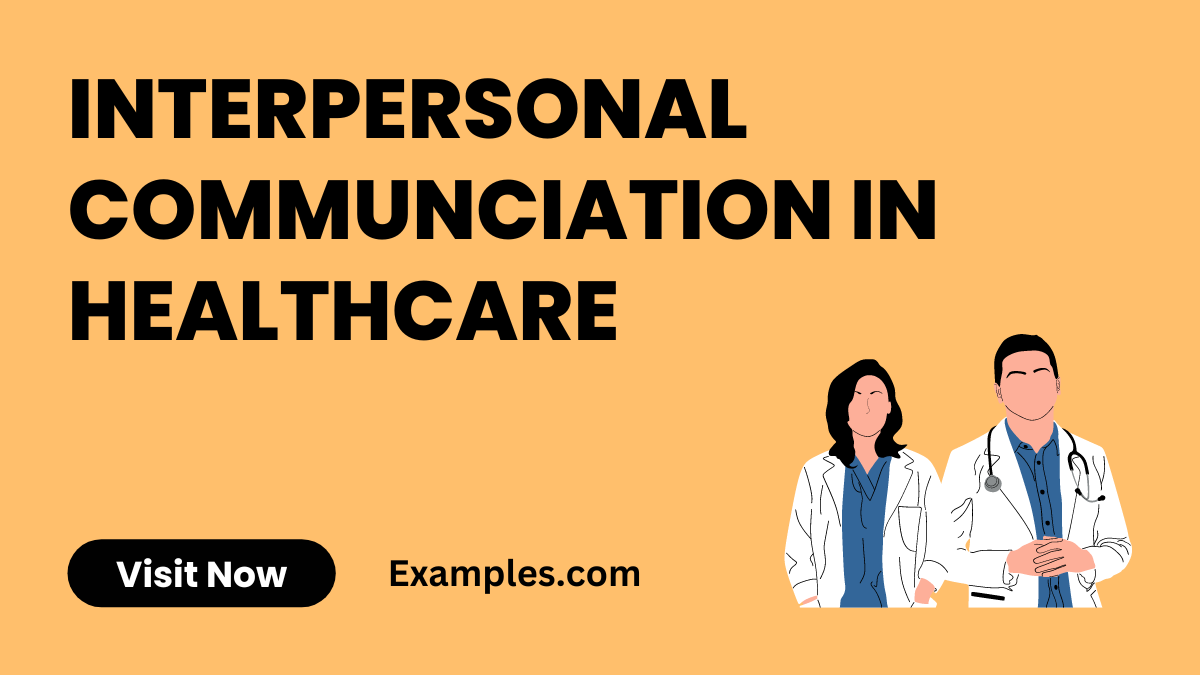20 Interpersonal Communication in Healthcare
In healthcare, interpersonal communication plays a critical role in enhancing patient care and building trust. Effective communication, particularly oral communication, is a vital skill for healthcare professionals. It involves not just the delivery of medical information but also understanding patient needs, providing emotional support, and building rapport. Mastering this skill facilitates better diagnosis, treatment, and overall patient satisfaction, making it a cornerstone of quality healthcare.
What is Interpersonal Communication in Healthcare? – Definition

Interpersonal communication in healthcare refers to the exchange of information between healthcare providers and patients. It encompasses a range of communication types, including verbal, non-verbal, and written communication. This process is essential for accurate diagnosis, effective treatment, and providing compassionate care. It’s not just about conveying medical facts; it’s about understanding and responding to patients’ emotional and psychological needs, ensuring a holistic approach to healthcare.
Interpersonal Communication in Healthcare Example

Interpersonal communication in healthcare is pivotal for effective patient care and encompasses various types, from verbal to non-verbal communication. It involves not just the transmission of medical information but also empathetic listening and understanding patient emotions. Healthcare professionals use these skills to build trust, provide support, and enhance patient outcomes, making interpersonal communication a key component of successful healthcare delivery.
- Explaining a Diagnosis: “Your test results show that you have diabetes. Let’s talk about the next steps.”
- Responding to Patient Concerns: “I understand you’re worried about the surgery. Can I explain the process to help ease your concerns?”
- Showing Empathy: “I can see this is a difficult time for you. We’re here to support you through this.”
- Educating on Medication: “This medication will help with your symptoms. Here’s how and when to take it.”
- Active Listening: “Tell me more about your symptoms. I want to understand your experience fully.”
- Building Rapport: “I remember you mentioned your love for gardening. How is your garden doing?”
- Clarifying Patient Instructions: “Let’s go over the post-operative care instructions again to make sure they’re clear.”

- Offering Reassurance: “We have a great team here to take care of you during your treatment.”
- Discussing Treatment Options: “There are several treatment options available. Let’s discuss what might be best for you.”
- Expressing Understanding: “I understand that this information is overwhelming. We’ll go through it at your pace.”
- Giving Health Tips: “Incorporating a balanced diet and regular exercise can improve your health significantly.”
- Addressing Patient Fears: “It’s normal to feel anxious about this procedure. Here’s what you can expect.”
- Encouraging Questions: “Do you have any questions or concerns about your treatment plan?”
- Comforting a Patient: “I’m here to help you. You’re not alone in this journey.”
- Discussing Lifestyle Changes: “Making some lifestyle changes can have a positive impact on your health. Let’s explore some options.”
- Providing Feedback: “You’ve made great progress with your rehabilitation. Keep up the good work!”
- Negotiating Treatment Plans: “Let’s find a treatment plan that aligns with your lifestyle and preferences.”

- Conveying Compassion: “I’m sorry to hear about your recent loss. We’re here to support you.”
- Facilitating Family Discussions: “Would you like your family involved in discussing your care plan?”
- Ensuring Understanding: “I want to make sure you understand everything. Is there anything else you’d like me to explain?”
Interpersonal Communication in Health Care Settings
In health care settings, interpersonal communication plays a crucial role in patient care, team coordination, and the overall healthcare delivery process. Effective communication within these environments can significantly impact patient outcomes, staff satisfaction, and the efficiency of healthcare services.
- Patient-Centered Communication: Prioritizing patient needs and preferences in communication helps in building trust and understanding. It involves active listening, empathy, and clear verbal communication to understand patient concerns and expectations.
- Team Collaboration: Effective communication among healthcare professionals ensures efficient teamwork and better coordination of patient care. This includes discussing patient cases, sharing expertise, and providing updates on patient status.
- Crisis Communication: In emergencies, clear and concise communication is vital. It involves quick decision-making, transmitting critical information accurately, and ensuring all team members understand their roles.
- Cultural Sensitivity: Understanding and respecting cultural differences in communication styles is essential in diverse healthcare settings. This sensitivity enhances patient comfort and compliance with treatment plans.
- Digital Communication: The use of digital tools for communication, such as electronic health records and telehealth platforms, has become integral in modern healthcare. These tools facilitate the sharing of information and improve accessibility for patients.
Elements of Interpersonal Communication Affect Health
The elements of interpersonal communication play a significant role in health outcomes. Understanding these elements can help healthcare professionals optimize their communication strategies for better patient care.
- Verbal and Non-Verbal Communication: The words used by healthcare providers and their non-verbal cues, like body language and facial expressions, significantly affect patient understanding and comfort levels.
- Listening Skills: Active listening is crucial in healthcare settings. It ensures that healthcare providers fully comprehend patient concerns and can respond appropriately.
- Empathy and Compassion: Demonstrating empathy and compassion in communication can significantly impact patient trust and satisfaction. It involves acknowledging patient emotions and showing genuine care.
- Feedback Mechanisms: Feedback from patients and colleagues is vital for continuous improvement in communication skills. It helps healthcare providers understand the effectiveness of their interactions.
- Clarity and Conciseness: Especially in healthcare, where complex information is often conveyed, clarity and conciseness in communication are essential to avoid misunderstandings and ensure patient comprehension.
- Cultural Competence: Being culturally competent means understanding and respecting the diverse cultural backgrounds of patients, which can influence their healthcare experiences and communication preferences.
- Emotional Intelligence: The ability to manage one’s own emotions and understand others’ emotions is key in healthcare settings. It helps in handling sensitive conversations and managing stressful situations effectively.
- Contextual Awareness: Understanding the context in which communication occurs, including environmental and situational factors, can influence the approach and effectiveness of interpersonal interactions in healthcare.
Why is Interpersonal Communication Important in Healthcare?
Interpersonal communication in healthcare is not just important; it’s a fundamental aspect of patient care. Effective communication between healthcare providers and patients ensures that medical information is accurately conveyed and understood. This communication involves both verbal and non-verbal cues and is essential for several reasons:
- Ensures Accurate Diagnosis: Clear communication helps healthcare professionals understand patients’ symptoms and concerns, leading to accurate diagnoses.
- Improves Patient Compliance: When patients understand their treatment plans, they are more likely to follow medical advice and take medications correctly.
- Builds Trust: Effective interpersonal communication fosters trust between patients and healthcare providers, crucial for a successful healthcare journey.
- Enhances Patient Satisfaction: Patients feel more satisfied with their care when they are heard and understood by their healthcare providers.
- Facilitates Emotional Support: Healthcare is not just about physical wellbeing; emotional support through empathetic communication is vital for patient recovery.
- Reduces Errors: Clear communication minimizes the risk of medical errors, improving patient safety.
- Promotes Holistic Care: Understanding patients’ emotional, cultural, and social contexts through effective communication leads to more holistic and personalized care.
How Does Interpersonal Communication Affect Healthcare?
The impact of interpersonal communication on healthcare is profound and multifaceted. Here’s how it affects the healthcare sector:
- Patient-Provider Relationship: Strong communication skills help in building a positive patient-provider relationship, essential for effective care.
- Team Coordination: In healthcare settings, interpersonal communication is crucial for coordinating among various healthcare professionals, ensuring seamless patient care.
- Health Outcomes: Clear and compassionate communication can positively influence patients’ health outcomes by ensuring understanding and adherence to treatment plans.
- Patient Empowerment: When healthcare providers communicate effectively, patients feel more empowered to make informed decisions about their health.
- Conflict Resolution: Effective communication skills are key in resolving conflicts that may arise in healthcare settings, whether with patients or among staff.
- Cultural Sensitivity: In diverse settings, interpersonal communication skills help healthcare professionals to be culturally sensitive, addressing the unique needs of different patient populations.
- Education and Counseling: Healthcare providers often use interpersonal communication for patient education and counseling, which is essential for managing chronic conditions and promoting healthy behaviors.
- Crisis Management: In times of crisis, such as a public health emergency, clear and empathetic communication is vital to manage patient fears and expectations.
- Feedback and Improvement: Open communication channels allow for feedback from patients, which is crucial for continuous improvement in healthcare services.
- Mental Health Care: In mental health care, the therapeutic alliance heavily depends on effective interpersonal communication, highlighting its importance beyond physical health.
Effective interpersonal communication is paramount in healthcare settings. This guide and its tips emphasize the importance of clear, empathetic, and patient-centered communication. By following these principles, healthcare professionals can build trust, improve patient outcomes, and ensure a compassionate and efficient healthcare experience. Mastering these skills is essential for providing quality care and fostering positive patient relationships.



